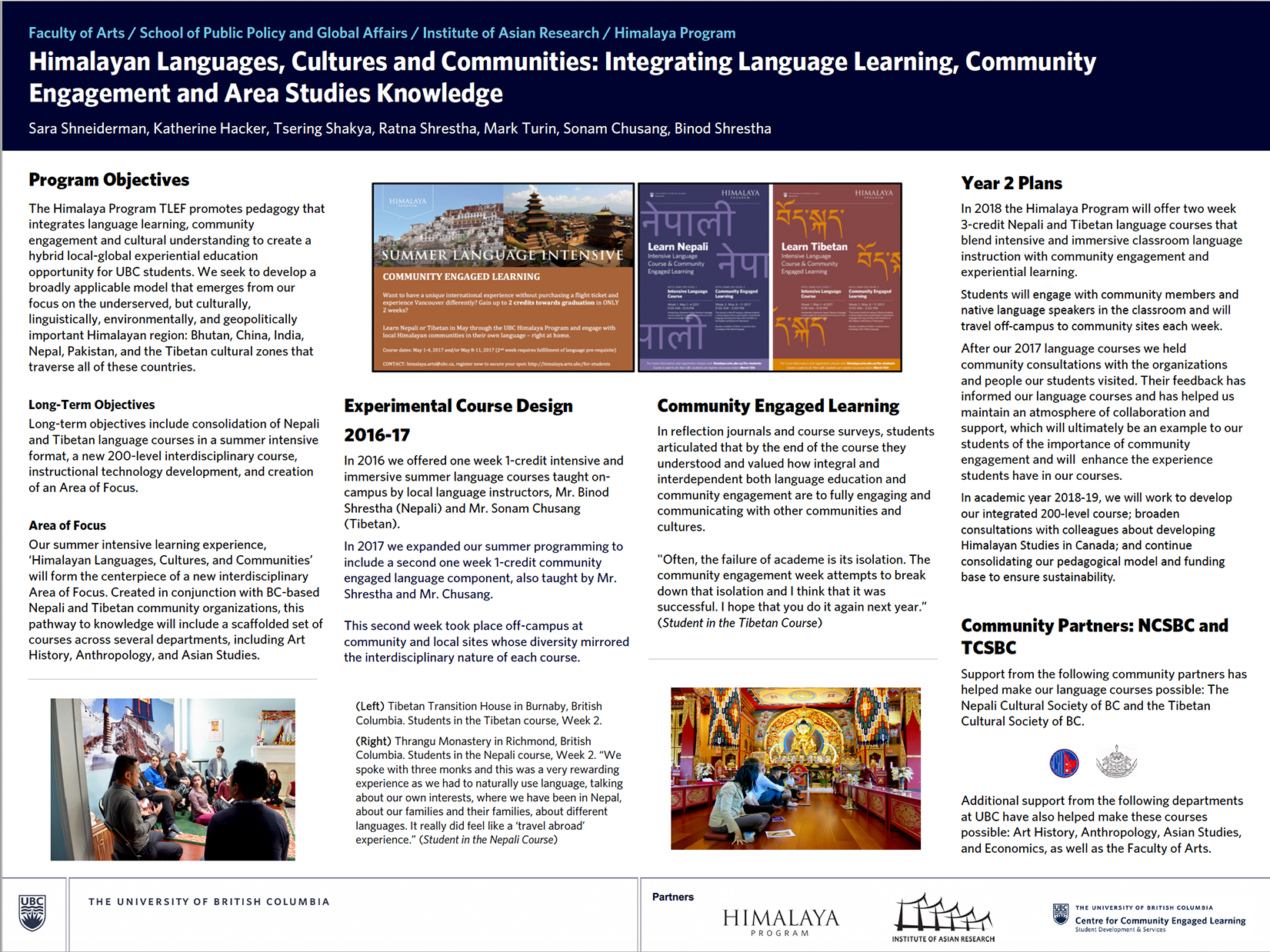| Title | Himalayan Languages, Cultures, and Communities: integrating language learning, community engagement, and Area Studies knowledge |
|---|---|
| Faculty/College/Unit | Arts |
| Status | Completed |
| Duration | 3 Years |
| Initiation | 04/01/2017 |
| Completion | 03/31/2020 |
| Funding Details | |
| Year 1: Project Title | Designing a Himalayan Studies minor: integrating community engagement language learning and Area Studies knowledge |
| Year 1: Project Year | Year 1 |
| Year 1: Funding Year | 2017/2018 |
| Year 1: Project Type | Small TLEF |
| Year 1: Principal Investigator | Sara Shneiderman |
| Year 1: Funded Amount | 17,703 |
| Year 1: Team Members | Sara Shneiderman, Assistant Professor, Anthropology and Institute of Asian Research, Faculty of Arts |
| Year 1: Summary | We propose to develop a Himalayan Studies minor that integrates the concepts of global citizenship and local community engagement with immersive language learning—all in relation to an underserved, but culturally and geopolitically important world area. There is presently no program in Himalayan Studies at any Canadian institution; UBC is poised to be a leader in this field. Housed in the Faculty of Arts, the minor will be designed in collaboration with the Nepali and Tibetan communities of Vancouver. TLEF funding will support two primary objectives: developing a sustainability plan to ensure the long-term viability of existing intensive summer language courses in Nepali and Tibetan; and designing a 200-level year-long interdisciplinary, transregional foundational course in Himalayan Studies. Our project team includes faculty from Anthropology, Art History, Asian Studies, Economics, FNEL and IAR, who have worked together since 2014 to build the UBC Himalaya Program. |
| Year 1: TLEF Showcase |  |
| Year 2: Project Title | Himalayan Languages, Cultures, and Communities: integrating language learning, community engagement, and Area Studies knowledge |
| Year 2: Project Year | Year 2 |
| Year 2: Funding Year | 2018/2019 |
| Year 2: Project Type | Small TLEF |
| Year 2: Principal Investigator | Sara Shneiderman |
| Year 2: Funded Amount | 27,123 |
| Year 2: Team Members | Sara Shneiderman, Assistant Professor, Anthropology and Institute of Asian Research, Faculty of Arts |
| Year 2: Summary | The UBC Himalaya Program seeks a second year of TLEF funding to further develop pedagogy that integrates language learning, community engagement and cultural understanding to create a hybrid local-global experiential education opportunity for UBC students. We will develop a broadly applicable model that emerges from our focus on the underserved, but culturally, linguistically, environmentally, and geopolitically important Himalayan region: Bhutan, China, India, Nepal, Pakistan, and the Tibetan cultural zones that traverse all of these countries. Our summer intensive learning experience, ‘Himalayan Languages, Cultures, and Communities’ will form the centerpiece of a new interdisciplinary Area of Focus. Created in conjunction with BC-based Nepali and Tibetan community organizations, this pathway to knowledge will include a scaffolded set of courses across several departments. Objectives include consolidation of Nepali and Tibetan language courses in a summer intensive format, a new 200-level interdisciplinary course, instructional technology development, and creation of an Area of Focus. |
| Year 2: TLEF Showcase |  |
| Year 3: Project Year | Year 3 |
| Year 3: Funding Year | 2019/2020 |
| Year 3: Project Type | Small TLEF |
| Year 3: Principal Investigator | Sara Shneiderman |
| Year 3: Funded Amount | 5,174 |
| Year 3: Team Members | Sara Shneiderman, Associate Professor, School of Public Policy and Global Affairs and Anthropology, Faculty of Arts |
| Year 3: Summary | The UBC Himalaya Program seeks a third year of funding to further integrate language learning, community engagement and cultural understanding to provide local-global experiential education opportunities for UBC students. This application is guided by three central aims. 1) Consolidate evaluation of our 2018 summer language courses to develop a toolkit for community-engaged language learning in a format transposable to other language communities. 2) Working from the recommendations of the Faculty of Arts and our new partner, the Department of Asian Studies, investigate offering our summer language program as an immersive “Study Abroad at Home” experience. In this residential model, UBC students would study Nepali or Tibetan for six weeks while living at a Himalayan monastery in Greater Vancouver. 3) Complete work on our proposed 300-level academic course “Himalayan Diversities,” an interdisciplinary course located in the Department of Anthropology that will feature visits from Himalayan community members and scholars across UBC and Metro Vancouver. |
| Project Report | 2019-TLEF-Final-Report-Shneiderman-WEB.pdf |